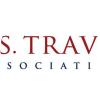According to research from U.S. Travel, even as consumer and business sentiment slips quickly in the face of higher inflation and concerns about a recession continue to linger, the travel recovery has so far remained intact. Travel spending exceeded its 2019 benchmark for the second consecutive month in May.
Nevertheless, gasoline prices appear to be starting to impact air and auto demand. Air passenger volume in May worsened for the first time since January. Similarly, auto trips declined to 2% below their May 2019 levels while overseas arrivals remained flat in May, at 43% below their 2019 level.
Predictive indicators are pointing upward for a business travel recovery, at least over the short term. Group room night bookings pace improved and nearly all U.S. surveyed companies are already conducting or anticipate conducting business travel over the next three months. But headwinds remain and our latest forecast projects that the business travel recovery will taper off starting next year.
Elevated inflation has weighed on consumer sentiment, but traveler sentiment remains highly positive, as travelers who had delayed travel due to virus fears are beginning to travel once again. High inflation will continue to erode household savings, recession fears will weigh on travel sentiment and labor shortages are expected to limit some available travel services. However, the improving health situation, rising incomes and accumulated household savings should help to unleash remaining pent-up travel demand from both the leisure and business segments, at least in the short term, more than offsetting near term headwinds.







